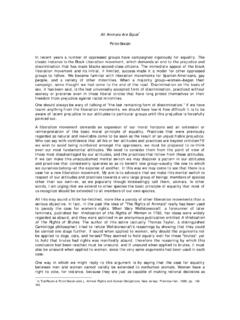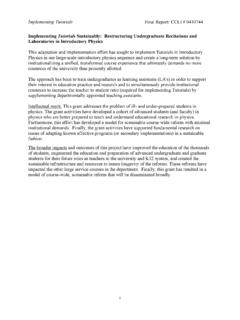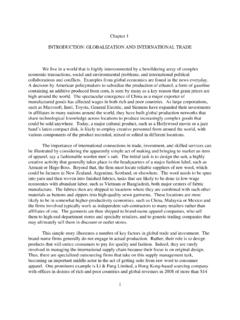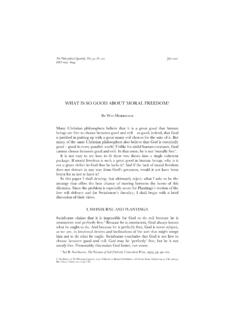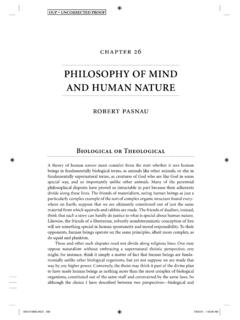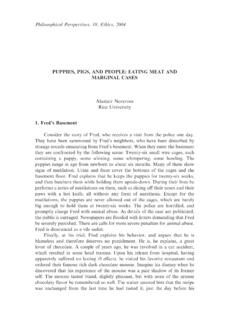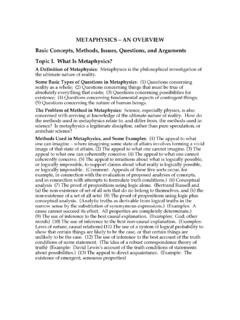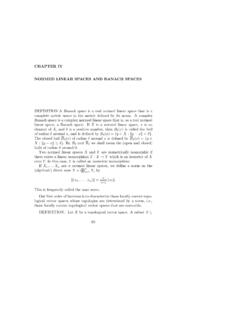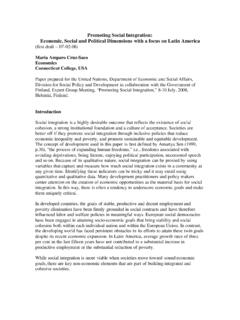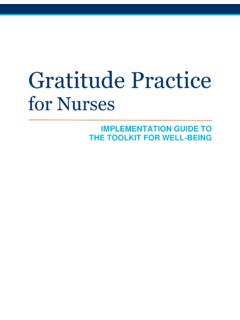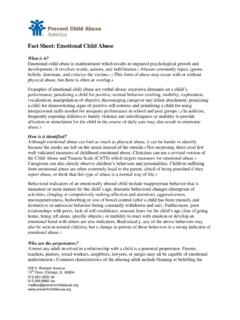Transcription of Mary Anne Warren: On the Moral and Legal Status of …
1 On the Moral and Legal Status of AbortionMary Anne Warrenfrom Biomedical Ethics. 4th ed. Mappes and D. DeGrazia, York: McGraw-Hill, Inc. 1996, pp. 434-440. [notes notincluded]The question which we must answer in order to produce asatisfactory solution to the problem of the Moral Status of abortionis this: How are we to define the Moral community , the set ofbeings with full and equal Moral rights, such that we can decidewhether a human fetus is a member of this community or not?What sort of entity, exactly, has the inalienable rights to life, liberty,and the pursuit of happiness? Jefferson attributed these rights to allmen, and it may or may not be fair to suggest that he intended toattribute them only to men. Perhaps he ought to have attributedthem to all human beings. If so, then we arrive, first, at [John]Noonan's problem of defining what makes a being human, and,second, at the equally vital question which Noonan does notconsider, namely, What reason is there for identifying the moralcommunity with the set of all human beings, in whatever way wehave chosen to define that term?
2 1. ON THE DEFINITION OF "HUMAN"One reason why this vital second question is so frequentlyoverlooked in the debate over the Moral Status of abortion is thatthe term `human' has two distinct, but not often distinguished,senses. This fact results in a slide of meaning, which serves toconceal the fallaciousness of the traditional argument that since (1)it is wrong to kill innocent human beings, and (2) fetuses areinnocent human beings, then (3) it is wrong to kill fetuses. For if`human' is used in the same sense in both (1) and (2) then,whichever of the two senses is meant, one of these premises isquestion-begging. And if it is used in two different senses then ofcourse the conclusion doesn't , (1) is a self-evident Moral truth,' and avoids begging thequestion about abortion, only if `human being' is used to meansomething like `a full-fledged member of the Moral community .
3 ' (Itmay or may not also be meant to refer exclusively to members ofthe species Homo sapiens.) We may call this the Moral sense of`human.' It is not to be confused with what we call the geneticsense, , the sense in which any member of the species is ahuman being, and no member of any other species could be. If (1)is acceptable only if the Moral sense is intended, (2) isnon-question-begging only if what is intended is the genetic "Deciding Who is Human," Noonan argues for the classification ofMary Anne Warren: On the Moral and Legal Status of Abortionfile:///Colorado/1200summer10 of 107/9/12 10:45 AMfetuses with human beings by pointing to the presence of the fullgenetic code, and the potential capacity for rational thought.' It isclear that what he needs to show, for his version of the traditionalargument to be valid, is that fetuses are human in the Moral sense,the sense in which it is analytically true that all human beings havefull Moral rights.
4 But, in the absence of any argument showing thatwhatever is genetically human is also morally human, and he givesnone, nothing more than genetic humanity can be demonstrated bythe presence of the human genetic code. And, as we will see, thepotential capacity for rational thought can at most show that anentity has the potential for becoming human in the Moral DEFINING THE Moral COMMUNITYCan it be established that genetic humanity is sufficient for moralhumanity? I think that there are very good reasons for not definingthe Moral community in this way. I Would like to suggest analternative way of defining the Moral community , which I will arguefor only to the extent of explaining why it is, or should be,self-evident. The suggestion is simply that the Moral communityconsists of all and only people, rather than all and only humanbeings,' and probably the best way of demonstrating itsself-evidence is by considering the concept of personhood, to seewhat sorts of entity are and are not persons, and what the decisionthat a being is or is not a person implies about its Moral characteristics entitle an entity to be considered a person?
5 This is obviously not the place to attempt a complete analysis of theconcept of personhood, but we do not need such a fully adequateanalysis just to determine whether and why a fetus is or isn't aperson. All we need is a rough and approximate list of the mostbasic criteria of personhood, and some idea of which, or how many,of these an entity must satisfy in order to properly be considered searching for such criteria, it is useful to look beyond the set ofpeople with whom we are acquainted, and ask how we would decidewhether a totally alien being was a person or not. (For we have noright to assume that genetic humanity is necessary forpersonhood.) Image a space traveler who lands on an unknownplanet and encounters a race of beings utterly unlike any he hasever seen or heard of. If he wants to be sure of behaving morallytoward these beings, he has to somehow decide whether they arepeople, and hence have full Moral rights, or whether they are thesort of thing which he need not feel guilty about treating as, forexample, a source of should he go about making this decision?
6 If he has someanthropological background, he might look for such things asreligion, art, and the manufacturing of tools, weapons, or shelters,since these factors have been used to distinguish our human fromour prehuman ancestors, in what seems to be closer to the moralMary Anne Warren: On the Moral and Legal Status of Abortionfile:///Colorado/1200summer10 of 107/9/12 10:45 AMthan the genetic sense of `human.' And no doubt he would be rightto consider the presence of such factors as good evidence that thealien beings were people, and morally human. It would, however,be overly anthropocentric of him to take the absence of these thingsas adequate evidence that they were not, since we can imaginepeople who have progressed beyond, or evolved without everdeveloping, these cultural suggest that the traits which are most central to the concept ofpersonhood, or humanity in the Moral sense, are, very roughly, thefollowing:Consciousness (of objects and events external and/or internalto the being), and in particular the capacity to feel pain; (the developed capacity to solve new and relativelycomplex problems); activity (activity which is relativelyindependent of either genetic or direct external control).
7 Capacity to communicate, by whatever means, messagesof an indefinite variety of types, that is, not just with anindefinite number of possible contents, but on indefinitelymany possible topics; presence of self-concepts, and self-awareness, eitherindividual or racial, or , there are apt to be a great many problems involved informulating precise definitions of these criteria, let alone indeveloping universally valid behavioral criteria for deciding whenthey apply. But I will assume that both we and our explorer knowapproximately what (1)-(5) mean, and that he is also able todetermine whether or not they apply. How, then, should he use hisfindings to decide whether or not the alien beings are people? Weneedn't suppose that an entity must have all of these attributes tobe properly considered a person; (1) and (2) alone may well besufficient for personhood, and quite probably (1)-(3) are do we need to insist that any one of these criteria isnecessary for personhood, although once again (1) and (2) look likefairly good candidates for necessary conditions, as does (3), if`activity' is construed so as to include the activity of we need to claim, to demonstrate that a fetus is not a person, isthat any being which satisfies none of (1)-(5) is certainly not aperson.
8 I consider this claim to be so obvious that I think anyonewho denied it, and claimed that a being which satisfied none of(1)-(5) was a person all the same, would thereby demonstrate thathe had no notion at all of what a person is-perhaps because he hadconfused the concept of a person with that of genetic humanity. Ifthe opponents of abortion were to deny the appropriateness ofthese five criteria, I do not know what further arguments wouldMary Anne Warren: On the Moral and Legal Status of Abortionfile:///Colorado/1200summer10 of 107/9/12 10:45 AMconvince them. We would probably have to admit that ourconceptual schemes were indeed irreconcilably different, and thatour dispute could not be settled do not expect this to happen, however, since I think that theconcept of a person is one which is very nearly universal (topeople), and that it is common to both proabortionists andantiabortionists, even though neither group has fully realized therelevance of this concept to the resolution of their , I think that on reflection even the antiabortionistsought to agree not only that (1)-(5) are central to the concept ofpersonhood, but also that it is a part of this concept that all andonly people have full Moral rights.
9 The concept of a person is in parta Moral concept; once we have admitted that x is a person we haverecognized, even if we have not agreed to respect, x's right to betreated as a member of the Moral community . It is true that theclaim that x is a human being is more commonly voiced as part ofan appeal to treat x decently than is the claim that x is a person,but this is either because `human being' is here used in the sensewhich implies personhood, or because the genetic and Moral senseof `human' have been if (1)-(5) are indeed the primary criteria of personhood, then itis clear that genetic humanity is neither necessary nor sufficient forestablishing that an entity is a person. Some human beings are notpeople, and there may well be people who are not human beings. Aman or woman whose consciousness has been permanentlyobliterated but who remains alive is a human being which is nolonger a person; defective human beings, with no appreciablemental capacity, are not and presumably never will be people; anda fetus is a human being which is not yet a person, and whichtherefore cannot coherently be said to have full Moral of the next century should be prepared to recognize highlyadvanced, self-aware robots or computers, should such bedeveloped, and intelligent inhabitants of other worlds, should suchbe found, as people in the fullest sense, and to respect their moralrights.
10 But to ascribe full Moral rights to an entity which is not aperson is as absurd as to ascribe Moral obligations andresponsibilities to such an FETAL DEVELOPMENT AND THE RIGHT TO LIFETwo problems arise in the application of these suggestions for thedefinition of the Moral community to the determination of theprecise Moral Status of a human fetus. Given that the paradigmexample of a person is a normal adult human being, then (1) Howlike this paradigm, in particular how far advanced since conception,does a human being need to be before it begins to have a right tolife by virtue, not of being fully a person as of yet, but of being likea person? and (2) To what extent, if any, does the fact that a fetushas the potential for becoming a person endow it with some of thesame rights? Each of these questions requires some Anne Warren: On the Moral and Legal Status of Abortionfile:///Colorado/1200summer10 of 107/9/12 10:45 AMIn answering the first question, we need not attempt a detailedconsideration of the Moral rights of organisms which are notdeveloped enough, aware enough, intelligent enough, etc.
